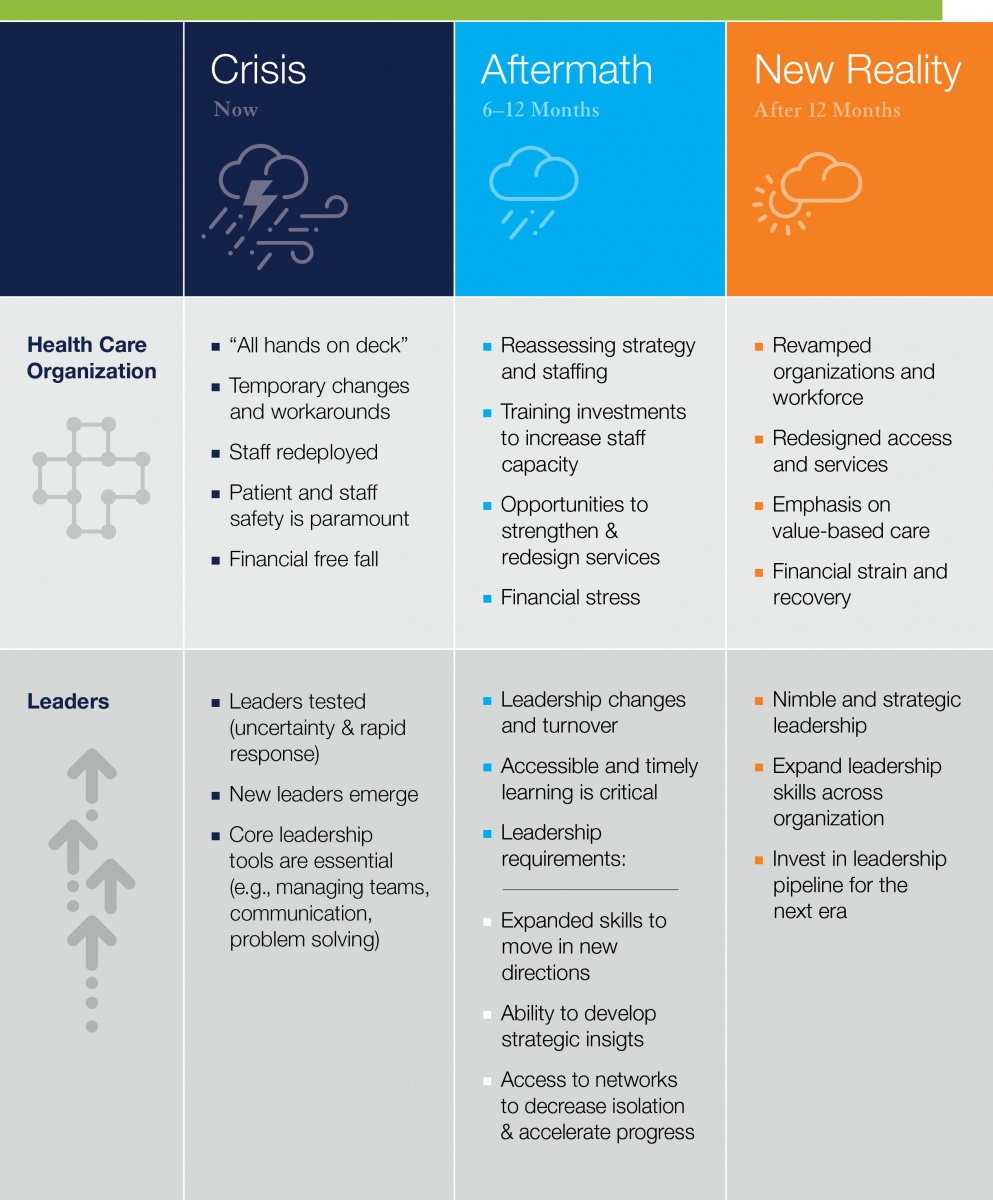By Sunita Mutha, MD, FACP, Director of Healthforce Center
For nearly three decades Healthforce Center has been training health care leaders at all levels — from emerging to executive levels. Since the beginning of the COVID-19 pandemic, we have been steadily hearing from alumni of Healthforce’s leadership programs about the experience of leading in a pandemic with the resulting chaos, diminished resources, and uncertainty. I am using what I learned every day. Never have I been more grateful for the leadership program. I am relying on my program peers constantly. Or, my personal favorite: We are stronger longer because of our experience. Our ability to lead in these uncertain times, will test our aptitude as leaders. Those who are able to acquire and apply the necessary skills and utilize their networks are the ones who will succeed.
Here at Healthforce Center, we believe that investing in the health care workforce is key to ensuring a responsive system of care that improves the health of our communities. The need for investing in leadership has never been more clear.
Healthforce's Leadership Beyond Crisis Framework

Leadership in Crisis
As the COVID-19 pandemic continues to make headlines the world over, every one of us is experiencing the realities of life in crisis mode. In these uncertain times, it’s all hands on deck. Organizations are focusing primarily on safety and the immediate needs of patients and personnel. This phase is also defined by the redeployment of staff to where they are needed and finding “good enough” solutions in the face of drastic changes. We are also seeing the dire economic consequences of this global pandemic play out, such as limitations on organizational resources and further exacerbating social disparities.
During this time of crisis, effective leaders need to focus on key skills that are foundational to success:
- Communication: Helping people feel safe and make sense of what’s happening; focusing on sharing what information is available, even when it’s incomplete or in flux. As someone committed to positive change, I recognize that understanding people’s experiences is a valuable opportunity to learn and support the resiliency of teams.
- Planning and implementation: Finding clarity in how we solve problems and defining a road map for success. In other words, what needs to happen, by when, with whom, and to achieve what outcome? While we work to meet the immediate needs of our patients and personnel, we are also beginning to plan for the aftermath of the crisis.
- Leading and managing teams: Knowing yourself and managing your own resilience, while simultaneously helping your team manage stress and risk for burn out. This includes navigating the challenges of maintaining cohesion with a remote workforce.
Leadership in the Aftermath of Crisis
The aftermath of the pandemic will require leaders to focus on bridging current realities to a new future by identifying the challenges and opportunities ahead. What did the organization learn? What adaptations are you seeing that fundamentally change the way your organization operates? The response to these questions will require leaders to strategically reassess their organizations, identify opportunities for operational improvements and capacity building, and invest in enhancing staff skills. In effect, we as leaders need to redesign the way we work for our new reality.
During this phase, we will see leadership turnover. Therefore, it will be a time for seasoned and new leaders to expand their skills and knowledge. This can’t happen without providing these leaders with the necessary tools and networks that support learning and change. Timely learning will help leaders navigate new challenges, including new organizational structures, strategic plans, and market changes. It will be vital for leaders to have robust peer networks to overcome isolation in order to navigate change and allow for an accelerated pace of progress.
It will be vital for leaders to have robust peer networks to overcome isolation in order to navigate change and allow for an accelerated pace of progress.
Some of the brightest spots I’ve seen during the pandemic come from those who’ve been through Healthforce Center’s leadership programs; alumni of our programs are much more skilled at navigating what’s happening, knowing what questions to ask, and crowdsourcing solutions with their peers. They are tapping into their program network for help with thinking through complexity, support, and reinventing the work of their organizations.
Leadership in the New Reality
As we eventually transition to our new post-pandemic reality, organizations are likely to undergo significant restructuring to improve access to services and deliver value-based care. This will likely continue to be a period of serious financial strain and recovery. Health care organizations can expect to see a changed payer mix and large increases in unemployed populations who rely on the safety net for care.
Health care leaders will be challenged to navigate and even thrive in these realities. This phase will call for the ability to rapidly scan the landscape for trends and use that knowledge to guide organizations in new directions, effectively adapt approaches to changing circumstances, and lead teams through change. Effective leaders will need to work to ensure better care for patients and a sustainable work environment for all staff. Consequently, we need to collectively invest in their training to ensure a pipeline of efficacious leaders for the coming era.
Rahm Emanuel is credited with having said, “Never let a good crisis go to waste.” This crisis has certainly made more visible the many things that are broken in our current health care system. I believe that in the midst of this current crisis, with a view to planning for what lies ahead in our new reality, we are in a position to reshape the landscape to ensure better health for our communities. Investing in our health care leaders is a vital step to ensuring that future is our reality.
Join Us
Sign up to learn about the latest health workforce research insights and leadership opportunities from Healthforce Center, an organization dedicated to helping health care organizations drive and navigate change.
About Sunita
Sunita Mutha, MD, FACP, is the director of Healthforce Center at UCSF. For over a decade, she has been engaged in transformational leadership in health care with a special focus on emerging leaders and inter-professional training.
